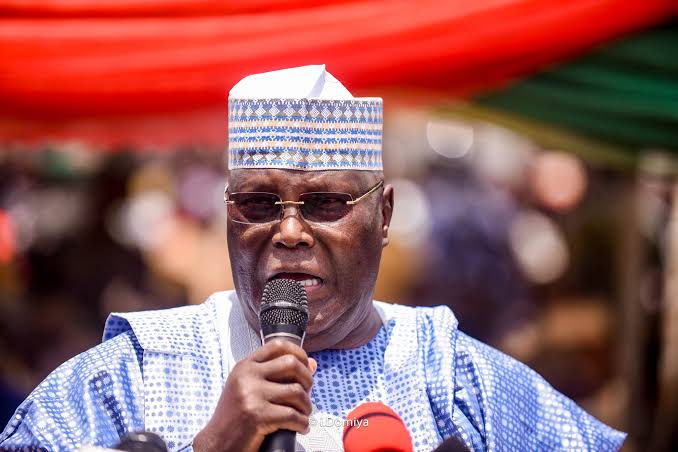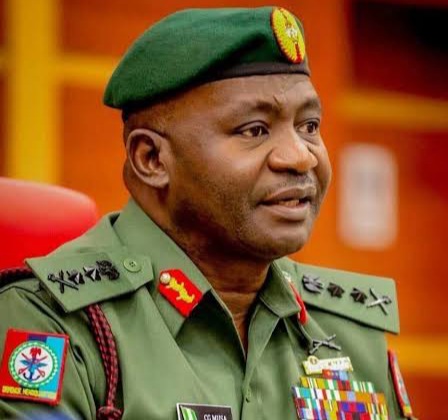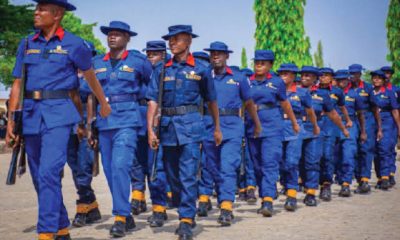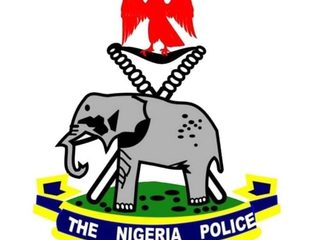
Atiku fumes as Military allegedly holds parade in honour of President Tinubu’s Son, Seyi
Atiku fumes as Military allegedly holds parade in honour of President Tinubu’s Son, Seyi
A military-style parade held for Seyi Tinubu, son of Nigerian President Bola Tinubu, has drawn sharp criticism from former presidential candidate Atiku Abubakar, who called for an immediate investigation into what he termed a “gross violation” of military protocols.
The incident, which came to light through a widely circulated video, showed armed personnel conducting a formal military parade for the president’s son.
The ceremony was reportedly organised by a group calling itself the “Nigeria Cadet Network.”
In a strongly worded statement issued through his Media Aide, Paul Ibe, Abubakar condemned the display as “nauseating” and an “aberration” of military tradition.
The former vice president questioned the legitimacy of the organising group, noting that the Nigeria Cadet Network is not officially recognised by the Nigerian Armed Forces.
“The unauthorised use of military customs to honor a private citizen represents a concerning departure from established protocols,” Abubakar stated.
He particularly took issue with the group’s appropriation of the term “Cadet,” which traditionally refers to formally trained military personnel.
The controversy has raised questions about the potential misuse of military traditions and the proper protocols for ceremonial honors in Nigeria’s armed forces.
“In an effort to uncover the truth behind this shameless procession, we instructed our legal team and military experts to investigate the so-called ‘Nigeria Cadet Network.’ To no one’s surprise, it was revealed that the group is not a legally registered entity.
“What is even more alarming is the brazen use of firearms by civilians in this so-called parade — at a time when illegal arms proliferation is at a dangerous high in our country.”
Atiku also asked for an urgent probe by all relevant security agencies to address the following critical concerns.
“The legitimacy of the ‘Nigeria Cadet Network’ and its use of the title ‘Cadet’ when it is not a registered entity.
“The origin and legality of the firearms displayed by members of the Nigeria Cadet Network.
“The propriety of the military honours granted to the President’s son by non-commissioned civilians under the protection of security personnel.
“If it is determined that legal violations were committed by the President’s son or members of the so-called ‘Nigeria Cadet Network,’ it is the constitutional duty of Nigerian security agencies to ensure that the law takes its course and those responsible are held accountable,” Atiku said.
News
Scores of terrorists neutralised after Major attacks on military base

Scores of terrorists neutralised after Major attacks on military base
Nigerian troops have successfully neutralised several terrorists and thwarted coordinated attacks in Adamawa and Borno States.
The Joint Task Force, Operation Hadin Kai, announced that the successes followed swift and decisive responses by soldiers to attempts by insurgents to overrun military formations in the North-East.
In a statement issued on Friday, Acting Media Information Officer of the Task Force, Lieutenant Solomon Atokolo, confirmed that the operations resulted in heavy casualties for the terrorists.
He explained that the first attack took place in the early hours of January 16, 2026, when insurgents targeted a patrol base at Sabon Gari in Madagali Local Government Area of Adamawa State.
Atokolo stated that troops under Sector 4 of Operation Hadin Kai quickly engaged the attackers and successfully repelled them. He added that reinforcements from Gulak and the Battalion Quick Reaction Force were promptly mobilised to support the operation, ensuring that the assault was decisively crushed.
“The terrorists were successfully repelled without any casualty to our troops or damage to equipment, forcing them to abandon the attack,” the statement said.
He added that security forces later carried out clearance operations in the surrounding area, scanning for improvised explosive devices and booby traps to guarantee the safety of both civilians and personnel.
In a separate incident on the same day, terrorists staged a large-scale, multi-directional attack on Forward Operating Base (FOB) Azir in Borno State.
The attackers attempted to breach the base’s defensive perimeter but were met with fierce resistance from troops. With support from the Air Component and other Nigerian Army aerial platforms, the soldiers unleashed sustained firepower that compelled the insurgents to retreat.
Although rocket-propelled grenade fire from the terrorists damaged some troop-carrying vehicles and partially affected the base’s CCTV control room, Atokolo said troops maintained full control of the situation and prevented any further breach.
The military spokesperson disclosed that several weapons and ammunition were recovered from the fleeing terrorists.
Items seized included a 60mm mortar tube, mortar bombs, locally fabricated explosives, heavy machine gun rounds, and hundreds of rounds of 7.62mm NATO ammunition.
The Joint Task Force commended the professionalism and resilience of the troops, reaffirming its commitment to sustaining operations aimed at restoring lasting peace and security to the North-East region.

Scores of terrorists neutralised after Major attacks on military base
Nigerian troops have successfully neutralised several terrorists and thwarted coordinated attacks in Adamawa and Borno States.
The Joint Task Force, Operation Hadin Kai, announced that the successes followed swift and decisive responses by soldiers to attempts by insurgents to overrun military formations in the North-East.
In a statement issued on Friday, Acting Media Information Officer of the Task Force, Lieutenant Solomon Atokolo, confirmed that the operations resulted in heavy casualties for the terrorists.
He explained that the first attack took place in the early hours of January 16, 2026, when insurgents targeted a patrol base at Sabon Gari in Madagali Local Government Area of Adamawa State.
Atokolo stated that troops under Sector 4 of Operation Hadin Kai quickly engaged the attackers and successfully repelled them. He added that reinforcements from Gulak and the Battalion Quick Reaction Force were promptly mobilised to support the operation, ensuring that the assault was decisively crushed.
“The terrorists were successfully repelled without any casualty to our troops or damage to equipment, forcing them to abandon the attack,” the statement said.
He added that security forces later carried out clearance operations in the surrounding area, scanning for improvised explosive devices and booby traps to guarantee the safety of both civilians and personnel.
In a separate incident on the same day, terrorists staged a large-scale, multi-directional attack on Forward Operating Base (FOB) Azir in Borno State.
The attackers attempted to breach the base’s defensive perimeter but were met with fierce resistance from troops. With support from the Air Component and other Nigerian Army aerial platforms, the soldiers unleashed sustained firepower that compelled the insurgents to retreat.
Although rocket-propelled grenade fire from the terrorists damaged some troop-carrying vehicles and partially affected the base’s CCTV control room, Atokolo said troops maintained full control of the situation and prevented any further breach.
The military spokesperson disclosed that several weapons and ammunition were recovered from the fleeing terrorists.
Items seized included a 60mm mortar tube, mortar bombs, locally fabricated explosives, heavy machine gun rounds, and hundreds of rounds of 7.62mm NATO ammunition.
The Joint Task Force commended the professionalism and resilience of the troops, reaffirming its commitment to sustaining operations aimed at restoring lasting peace and security to the North-East region.
News
Federal Govt warns States against negotiating with Bandits

Federal Govt warns States against negotiating with Bandits
The Minister of Defence, Christopher Musa, has urged state governments across the country to stop engaging in negotiations with bandits, warning that such actions undermine national security efforts.
Musa made the call during an interview with BBC Hausa, where he expressed concern that dialogue with criminal groups weakens ongoing military operations.
According to him, reaching agreements with bandits often proves futile, as they cannot be trusted to honour their commitments.
He argued that many of the criminals lack genuine remorse and are likely to renege on any deals struck with them.
The minister disclosed that the Katsina State Government was cautioned over its recent decision to facilitate the release of 70 suspected bandits from custody.
However, the Katsina government had defended the action, describing the move as essential to consolidating community-driven peace agreements with “repentant bandits” in several local government areas.
“Negotiation with bandits is not a way out, those people are not real, whenever they come for reconciliation, they need something,” Musa spoke in Hausa language.
“What’s happening in Katsina we told them, don’t ever make the mistake of reconciling with those people, they are liars.
“We begged people to stop negotiating with them and the government should stop. It’s not right and they will surely come back again. They don’t fear God.
“We already informed them it damages our work, we asked them to stop, you know it’s democracy now not military rule. But we are in talk with them.”
The defence minister refuted claim that the federal government pays ransom to kidnappers.
“Paying ransom is not good. People should stop paying ransom when they kidnap people. Report should be made and actions will be taken.”
“Federal government doesn’t pay for ransom. It might be other people and they are doing that on their own.”
-
6 years ago
Our situation in Kano terrible – Gov Ganduje cries out
-

 News11 months ago
News11 months agoFG pledges commitment to enhance Police officers Welfare, implement Tinubu’s 8-point agenda for NPF
-

 News11 months ago
News11 months agoBREAKING; NSCDC gets approval to commence 2025 recruitment exercise
-

 News9 months ago
News9 months agoAlleged cocaine deal: Court issues orders in suspended DCP Abba Kyari’s case
-

 News12 months ago
News12 months agoDPO under investigation for allegedly taking teenage girl to his home while in police custody
-

 News12 months ago
News12 months agoJUST IN; Commissioner of Police bows out of Service
-

 News9 months ago
News9 months agoJUST IN; Police Inspector dies watching Arsenal match
-

 News12 months ago
News12 months agoBREAKING; NLC declare nationwide protest


